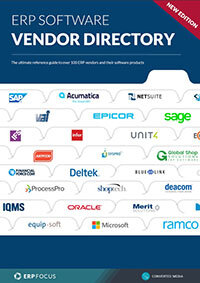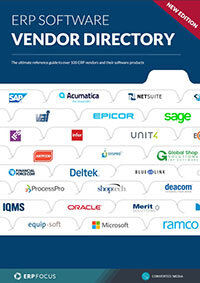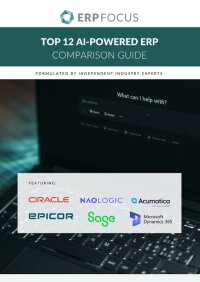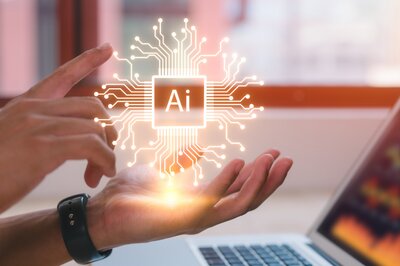Intelligent ERP systems: What AI can (and can’t) do
While AI in ERP is generating significant buzz, does this hype translate into real business transformation in integrated ERP solutions, or is it mostly overstated with little practical value? To answer that question, let’s first consider what AI actually means today. For example, Merriam-Webster defines artificial intelligence as "the capability of computer systems or algorithms to imitate intelligent human behavior."
In ERP systems, this refers to integrating AI features like machine learning, natural language processing, and predictive analytics. These tools help automate tasks and deliver more advanced, actionable insights.
Many solutions labeled as ‘AI-powered ERP’ are essentially advanced rule-based automation rather than true AI. While some vendors have added machine learning features like fraud detection and time-saving automation, they don’t yet offer fully autonomous AI decision-making.
Today’s ERP solutions still often rely on human-coded workflows, rules, and robotic process automation (RPA) to integrate data and generate reports, rather than on any learning-based intelligence.
For example, if one of those processes fails due to a programming error, the mistake propagates through reports and dashboards. In reality, these are just automation at scale: the system only “knows” what it was programmed to do. It doesn’t exhibit true AI intelligence.
ERP automation, not true AI (yet)
Overenthusiasm about AI can mislead buyers. Today’s ERP systems still require expert configuration and oversight, since far-future scenarios where software autonomously “understands” every need are not yet a reality. In practice, ERP remains the backbone of operations, and AI is a layer that enhances it, not something that completely replaces human effort.
Companies should prepare their teams, upskilling them to be able to manage the new AI-driven workflows.
Emerging AI capabilities in ERP software
That said, modern ERP suites do incorporate meaningful AI-powered features today. Examples include:
- AI-driven predictive analytics (such as demand forecasting and financial planning) to optimize supply chains and operations.
- Robotic Process Automation (RPA) for routine tasks like invoice processing, data entry, and report generation.
- Natural language interfaces and chatbots to handle user queries and support tasks (for example, customer inquiries or HR questions).
- Image recognition (computer vision) for tasks such as scanning invoices or monitoring product quality.
- Generative AI for automated content and report generation (drafting emails, summaries, or even code from ERP data).
These capabilities illustrate how intelligent ERP features work; each uses AI techniques to improve efficiency and insights. As IBM notes, AI can turn an ERP into an intelligent platform that learns from data, adapts to change, and optimizes operations in real time.
In practice, AI-driven ERP modules can continuously learn and improve: for example, NetSuite’s AI-powered analytics now forecast sales trends, optimize inventory levels, and identify supply-chain inefficiencies for users. Similarly, SAP’s machine learning can automate invoice clearing by predicting the right matching logic.
For construction management specifically, CMiC's AI-powered ERP makes data analytics simpler and more accessible. It turns complex data into conversational insights, giving users the tools to uncover key business insights. This streamlines the process and cuts down on time spent analyzing large datasets.
Likewise, chatbot interfaces let employees ask everyday questions (“How many widgets did we sell last year in Region X?”) in natural language and get answers immediately.
This is the future of ERP - not general AI, but embedded, contextual intelligence that reduces effort and enhances decisions.
The reality check: still not fully autonomous
That doesn’t mean we’ve reached AI that independently manages the business. Human oversight is still critical. These tools assist, not replace, your finance, supply chain, or HR teams.
Until ERP systems can fully understand ambiguous requests, adapt to new business logic without retraining, and learn from unstructured events at scale, ERP AI will remain task-specific and human-guided.
Still, today’s progress is substantial. We’re not waiting for a HAL9000-style breakthrough, we're watching ERP evolve into smarter, more efficient systems that support employees with real-time insights and suggested actions.
What buyers should watch for
If you're evaluating AI-powered ERPs, here's what to focus on:
- Vendor maturity: SAP, Oracle NetSuite, Acumatica, Microsoft, Infor, and CMiC are leading in embedded AI features. Compare what each offers now, not what’s coming soon.'
- Use case alignment: Choose platforms whose AI solves your business’s pain points, whether that’s demand forecasting, payment matching, or automated close processes.
- Data quality and structure: AI is only as good as the data it learns from. Platforms that support data normalization and cloud integration offer a better foundation for AI.
- User enablement: Tools like Microsoft Copilot and Oracle’s digital assistants work best when your staff are trained to use them. Look for ERPs with intuitive interfaces and strong onboarding.
Free white paper

ERP Software Vendor Directory
Put the most comprehensive ERP vendor directory on your desk today

Featured white papers
-

Top 12 AI-powered ERP comparison guide
Compare top vendors and learn how they can automate your repetitive workflows, drive greater efficiency, and yield higher ROI.
Download
Related articles
-

AI ERP systems: Intelligent solutions by business size
Learn how AI enhances ERP processes with predictive analytics, automation, & more. Includes recom...
-

CMMC Compliance: What Aerospace and Defense Manufacturers Need to Know
Key insights on CMMC compliance, deadlines, and securing DoD contracts with CMMC 2.0 certificatio...
-

What are the benefits of manufacturing ERP?
The advantages of ERP for manufacturing businesses

